For some jobs, you can get by purely on your own cunning, physical abilities, or ambition alone. SEO marketer is not one of those jobs.
In the digital age, marketers like me can't do what they do without the right tools—tools that help us track performance metrics, diagnose problems, suggest improvements, report on progress, and automate the little things we don't have time to do a hundred times a day.
I sifted through a ton of SEO software options (including ones I use regularly) to find what I think are the best SEO tools around. Here's what I found.
The 9 best SEO tools
seoClarity for an SEO AI assistant tool
Surfer for AI integration
Semrush for SEO rank tracking
SEOptimer for SEO audits
Ahrefs for competitor research
Clearscope for SEO content optimization
Letterdrop for SEO content automation
BuzzSumo for SEO content ideation
AnswerThePublic for content research on a budget
What is an SEO tool?
I define an SEO tool as any software you can use to improve some aspect of a search engine optimization campaign. These tools can serve many different functions, including search query analytics, reporting automation, AI-driven content optimization recommendations, and website performance analysis.
This gets tricky when you consider how many types of software marketers use for specific aspects of SEO. To try to keep some semblance of a level playing field, I excluded products that are narrowly focused on just one or two niche SEO use cases, like Moz's handy title tag tool. Instead, I focused on products that could fit into one of four distinct SEO product categories.
SEO audit tools: These tools are designed primarily to perform analysis of one or more metrics related to search engine optimization efforts.
Keyword research tools: The primary purpose of these tools is reporting on the search metrics of keywords or helping identify keywords to target. These don't necessarily measure ranking performance for specific webpages or domains.
Rank trackers: Nearly all SEO rank trackers can perform general keyword research, but their main function is monitoring how well specific webpages or domains rank for individual keywords. They also tend to include suites of other tools for SEO-related tasks, though not as many as all-in-one tools.
All-in-one tools: Similar to rank trackers, all-in-one SEO tools have many features, but their range of tools is more comprehensive. They can make tools from the other categories redundant and tend to include advanced features like automation and AI.
I was able to dig into a number of tools myself, but I wasn't able to personally test each of them. When I couldn't, I looked to firsthand accounts from real users, software demos, aggregated reviews, and Reddit forums to fill in the blanks.
What makes the best SEO tool?
How we evaluate and test apps
Our best apps roundups are written by humans who've spent much of their careers using, testing, and writing about software. Unless explicitly stated, we spend dozens of hours researching and testing apps, using each app as it's intended to be used and evaluating it against the criteria we set for the category. We're never paid for placement in our articles from any app or for links to any site—we value the trust readers put in us to offer authentic evaluations of the categories and apps we review. For more details on our process, read the full rundown of how we select apps to feature on the Zapier blog.
Since SEO tools can fall into distinct categories, nailing down what makes them great is a little complicated. To score them as objectively as possible, I reviewed dozens of products and whittled down a list of quality criteria that could apply to any category.
SEO-centric functionality: Each tool has to have functionality that relates to some element of search engine optimization. They should fit into one of the categories above by specializing in a function like keyword analysis, on-page performance troubleshooting, website performance reporting, content ideation, or competitor analysis.
Value: How well does the price represent the quality of the product? Tools with specific use cases should be effective enough to justify subscriptions for users with more comprehensive tools, just as comprehensive tools should have extensive feature suites, and paid tools in general should be more useful than free options.
User experience: How easy is the tool to integrate, learn, and use? The learning curve should be low enough for users to reliably access any feature they need in complex tools without resorting to more familiar, less functional tools.
Integrations: Since digital marketers tend to use many different software products, integration is key for SEO tools. Users should be able to integrate these tools readily into common platforms for related tasks like meetings, scheduling, reporting, and customer relationship management.
The best SEO tools at a glance
| Best for | Standout feature | Pricing |
|---|---|---|---|
An SEO AI assistant | Native generative AI assistant | Custom | |
AI integration | AI-powered content and SERP insights | From $89/month | |
Rank tracking | Modular dashboards | From $129.95/month | |
SEO audits | Actionable diagnostic recommendations | From $19/month | |
Competitor research | Content Gap tool | From $99/month | |
Content optimization | AI-driven content optimization | From $170/month | |
Scaling SEO content creation | Video-to-post automation | By request | |
Content ideation | Content Generator tool | From $199/month | |
Content research on a budget | Unique keyword data grouping | From $9/month |
Best AI assistant tool for SEO
seoClarity (Web)

SEO tool category: All-in-one
seoClarity pros:
Generative AI assistant
Extensive suite of SEO analysis tools
Rich content optimization tools
seoClarity cons:
Custom or unclear pricing for lowest and highest tiers
Expensive middle-tier plans
Fairly bare-bones interface
In a sea of niche SEO products, seoClarity is about as close to an all-in-one tool as it gets. With a wide range of both general SEO and content optimization features and an AI assistant, it can likely replace several other tools for many users.
On the SEO analysis end, seoClarity does a lot of what these other tools do. It offers rank monitoring, search trend insights, actionable diagnostic insights, performance scoring, page error and inefficiency detection, competitor analysis, traffic potential projections, topic exploration, and a whole lot more. For this specific use case of analysis, Ahrefs and Semrush are a little more robust because they're almost entirely dedicated to it. But seoClarity still holds its own, particularly by adding the kinds of on-page analysis utility you get from audit-centric products like SEOptimer and Surfer.
In addition to all those tools, seoClarity has an equally impressive suite of content creation and optimization tools. Like Clearscope, you can turn keywords identified by research and ideation features into blog posts within the interface. The Content Fusion feature allows you to either load an existing URL or start content from scratch with a keyword. From there, you can generate a brief for another writer, and then access the content management module.
What's really impressive about seoClarity's AI is Sia (not that Sia, though she's also very impressive), or seoClarity Intelligent Assistant. Sia is a GPT-powered generative AI feature that helps writers create optimized content. You can use Sia to automatically generate optimized post titles and meta descriptions backed by existing seoClarity search data. It (she?) can then generate outlines and expand individual sections into full text with the click of a mouse. All this is on top of the interface's existing AI, which scores on-page metrics and suggests keywords as you write. Beyond the writing stage, Sia can even assist with bulk tasks like translating keywords, grouping keywords into segments, and creating page titles and descriptions en masse.
All this makes seoClarity by far the most expensive tool on this list, but also the most comprehensive. This tool isn't for every company, but for those that can afford it, it effectively combines multiple SEO tool types into one platform.
seoClarity pricing: Essentials (custom), Core (starts at $3,000/month), Professional (starts at $4,500/month), Agency (by request)
Best SEO tool for AI integration
Surfer (Web)
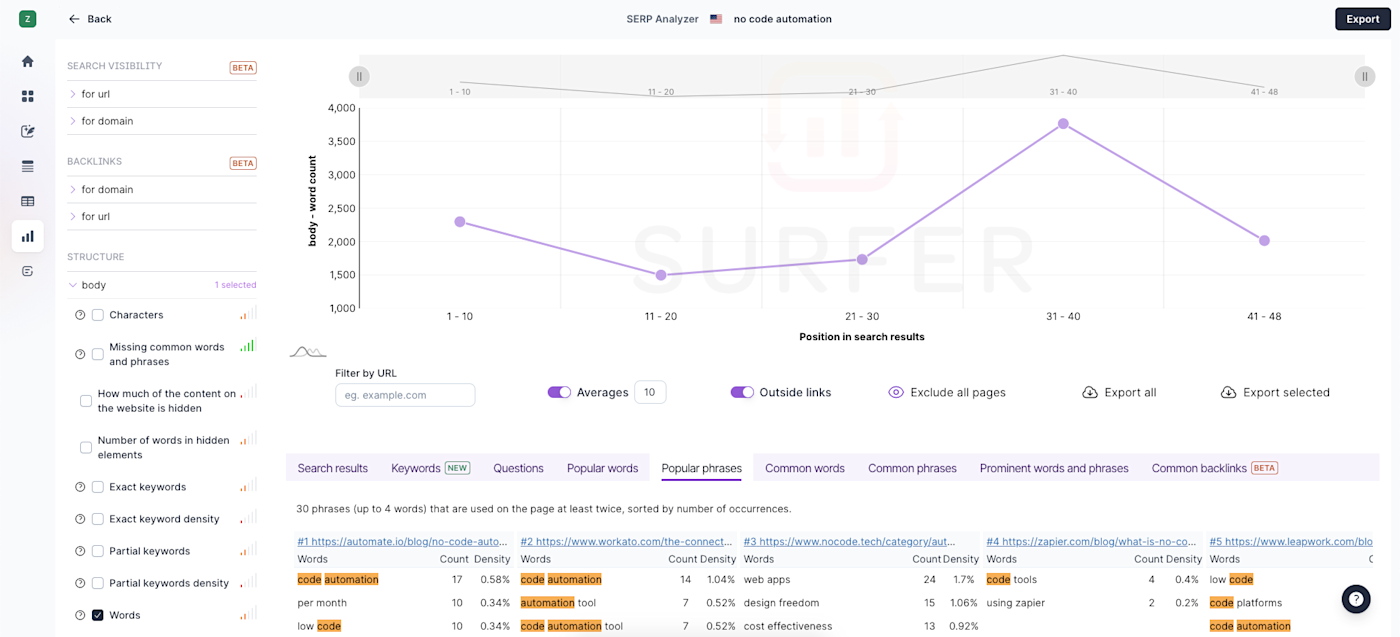
SEO tool category: SEO audit
Surfer pros:
Simple AI integrations
Unique SEO insights
Exports content directly to WordPress
Surfer cons:
Fairly expensive
Requires credits that don't roll over
Surfer AI feature is charged by article
Surfer is one of the more distinctive tools on this list. It's primarily an SEO auditing tool, but its depth of insights makes it very useful for keyword research, too. But the big draw for many users will be its compelling AI features.
Surfer offers a deceptively simple suite of five tools: Keyword Research, Content Editor, Audit, Domain Planner, and SERP Analyzer. On the surface, these are basically the same types of tools you'll find in many other products. But Surfer makes them more actionable by readily integrating AI.
For example, Surfer's Keyword Research tool separates topic ideas into clusters organized by user intent, which you can then load into the AI-driven Content Editor. Here, you can use Surfer AI to drop in an outline, write the article, and optimize the copy. You'll also see real-time structure ratings, related term suggestions, and content scoring, so you can tinker with on-page SEO strategies as you go. There's also a nifty outline tab that suggests questions and heading ideas. When you're done, you can collaborate with team members or export straight to WordPress.
The SERP Analyzer is also miles ahead of comparable tools from many competitors. I love the interactive chart that shows what links in the top 48 positions average for metrics like word counts, character counts, keyword density, and partial keywords. Below that, you can sort SERP links to see how competitors stack up for elements like popular phrases, keywords, common backlinks, and other keywords.
If all that AI utility isn't enough, Surfer also integrates with Jasper to make your content creation super (artificially) intelligent. It's worth noting that while the Jasper integration is available at all tiers, Surfer AI costs $29/article. Combined with the hefty subscription cost, Surfer is definitely a premium tool, but one that's absolutely worth it.
Surfer pricing: Essential ($89/month), Advanced ($179/month), Max ($299/month), Enterprise (custom)
Best SEO tool for rank tracking
Semrush (Web)
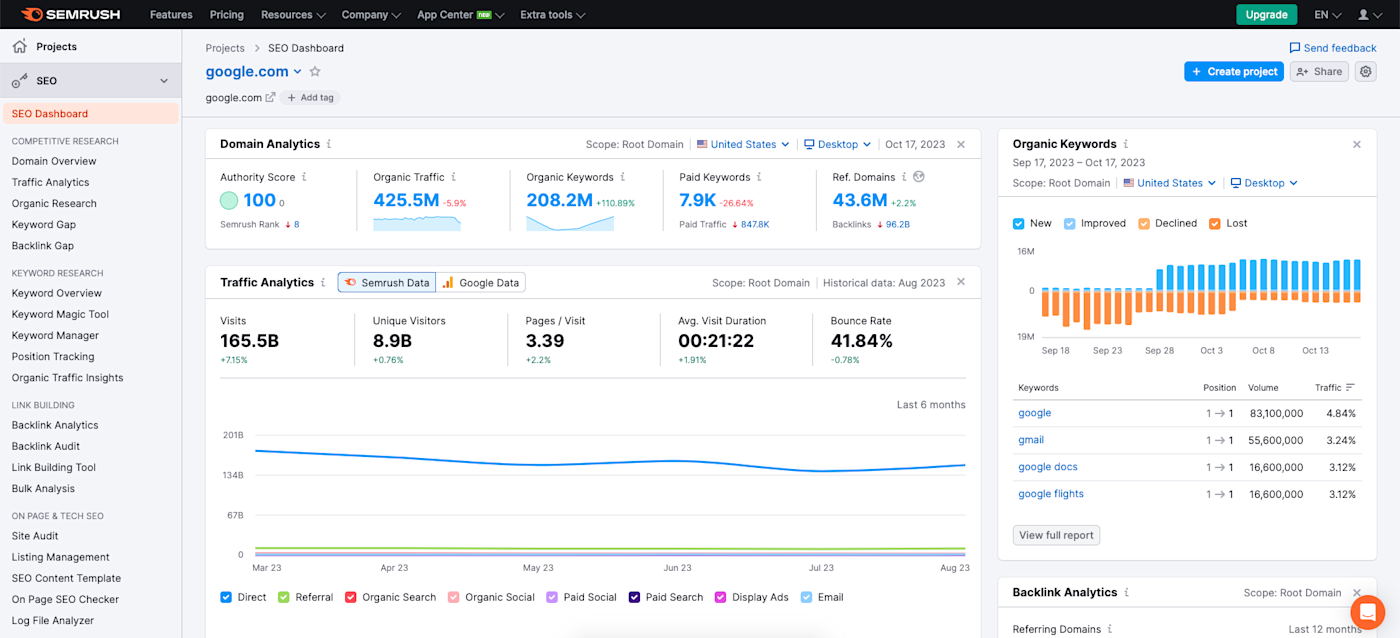
SEO tool category: Rank tracker
Semrush pros:
Massive suite of high-end rank and keyword tracking tools
Customizable dashboard
Enterprise-level functionality
Semrush cons:
Premium pricing
Not quite as feature-rich as all-in-one tools
Semrush is basically synonymous with SEO. This rank tracker's insights and features are robust and scalable enough to handle virtually all performance monitoring needs for SMBs and enterprises.
There's very little Semrush can't do, but most of its utility caters to keywords, SERP analysis, and page ranking metrics. Its highly detailed dashboard with customizable widgets gives a thorough overview of how well a tracked domain is performing in terms of metrics like authority, backlinks, traffic, organic keywords, and average time on site. You can drill down deeper into these within their dedicated widgets, or turn them into reports.
I don't have the space here to break down all of Semrush's additional tools, but here are a few highlights:
Keyword Gap: Compares webpages or domains to see missed keyword opportunities
Backlink Gap: Compares backlink profiles of separate webpages or domains
Keyword Magic Tool: Automatically suggests keywords related to a given search term
Position Tracking: Customizable daily updates on how your site and competitors are ranking for specific keywords
As a rank tracker, most of Semrush's features fall somewhere in the keyword and SERP monitoring spectrum, so it doesn't include some of the deep content optimization capabilities of other products on this list. However, Semrush has additional extensions that can fill in some of those gaps, like its free AI Writing Assistant app. Plus, it integrates with Zapier, massively expanding its integration and automation capabilities. Here are some examples of how it works.
Send Slack channel messages for completed SEMrush site audits
Re-crawl site audit campaigns in SEMrush when new site audits are completed
Create SEMrush overview reports for new Google Analytics goals
Create Google Tasks for new SEMrush site audit campaign tasks
Semrush pricing: Pro ($129.95/month), Guru ($249.95/month), Business ($499.95/month)
Best SEO tool for SEO audits
SEOptimer (Web)
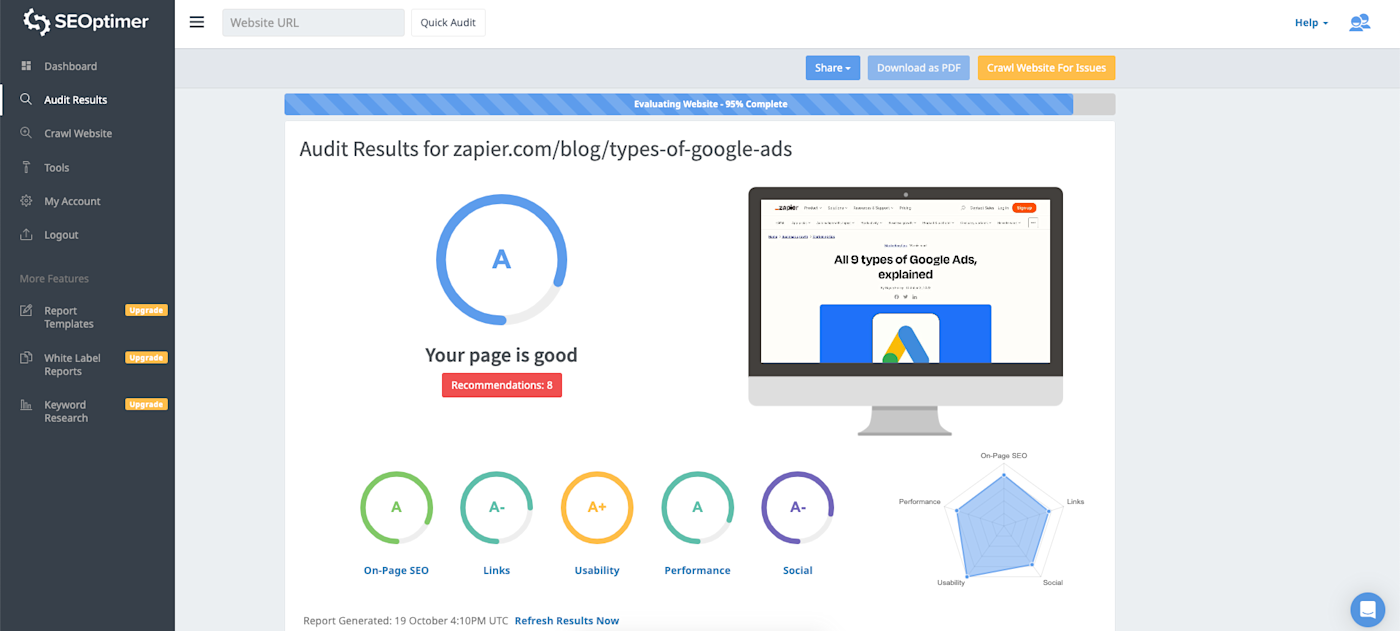
SEO tool category: SEO audit
SEOptimer pros:
Simple, effective SEO diagnostics
Wide range of tools for testing specific SEO elements
Reasonably priced
SEOptimer cons:
Limited suite of tools to fix issues
Many tools aren't particularly complex
SEO audit tools are like therapists: they can help you figure out what's wrong, but it's mostly up to you to fix it. SEOptimer specializes in diagnosing SEO-related performance issues with a website or individual webpage that comes with a few basic tools for helping address them.
Just plug a webpage into SEOptimer's dashboard, and you'll see a tidy sequence of performance grades on the A+ to F scale, usually in just a minute or so. This gives you a snapshot of where your page might be losing traffic based on-page SEO indicators, backlinks, user experience, overall performance, and social media connectivity. You'll also see a list of recommendations for solving these problems and getting your grade up (which may give serial overachievers like me flashbacks to asking their AP history teacher how they can raise their 93% A- one more point to an A).
These recommendations are largely insightful, specific, and actionable, which is the recommendation trifecta. That A- social presence, for example, stems from lacking a linked Instagram profile and missing Facebook Pixel code, which enables Facebook ad retargeting (not applicable fixes for that blog post, but still good to know). The Performance score is especially helpful, showing detailed load speed insights and noting specific elements like image compression, JavaScript errors, and image optimizations that may be keeping those speeds down.
Once you have your marching orders for fixing your page, SEOptimer has a few native tools you can use to help out, like code minifiers and meta tag, keyword, and XML sitemap generators. Beyond that, it also has a suite of additional tools for testing and analyzing specific SEO features like favicons, font sizes, noindex tags, canonical tags, SERP presentation, and even keyword ranking. Many of these tools aren't quite as sophisticated as they are in platforms dedicated to actionable SEO solutions—the ranking tool doesn't track keywords like a rank tracker, instead showing which 10 keywords a specific page is ranking for. But for fast, actionable diagnostics, it's still a useful product.
SEOptimer pricing: DIY SEO ($19/month), White Label ($29/month), White Label & Embedding ($59/month)
Best SEO tool for competitor research
Ahrefs (Web)

SEO tool category: Rank tracker
Ahrefs pros:
Accurate, timely ranking data
Detailed keyword analytics
Less expensive than Semrush
Ahrefs cons:
Limited reporting tools
Tool suite is mostly limited to analysis and monitoring
If Semrush isn't your speed, Ahrefs occupies a very similar space in the SEO tools ecosystem as a premium rank tracker with slightly cheaper subscription options. It's also my go-to tool for competitor analysis.
As a rank tracker, Ahrefs has many of the same features as Semrush. You can monitor specific webpages or domains to see how they rank for keywords over time, perform site audits, and explore historical ranking data with customizable charts. It's also got some appealing bonus features, like Web Explorer, which shows you ranking statistics for pages across the web for given keywords.
As a competitor analysis tool, Ahrefs is much more useful than tools on this list that cater to content optimization and keyword research, and I think it gets a slight edge on Semrush here as well. Its Content Gap tool can show you a detailed comparison of keywords specific competitors are ranking for, as well as which SERP features they're winning, like Google image packs. I also like the Link Intersect tool, which shows you which pages are linking to your competitors.
When you find potential competitors using one of these tools or by exploring who's ranking for targeted keywords, you can drill down into those domains and webpages further. By seeing which pages in a given domain earn the most backlinks, which earn the most traffic, and which keywords bring in the most value, you can get valuable insights into the kinds of content that wins for your industry. The Ahrefs traffic value metric is also really useful here, showing you in real dollar terms how successful keywords can be if you can rank for them.
Like Semrush, Ahrefs isn't likely to be a one-stop shop for all your SEO and content needs. But it's a powerful ranking tool with some really effective competitor analysis features.
Ahrefs pricing: Lite ($99/month), Standard ($199/month), Advanced ($399/month), Enterprise ($999/month)
Best SEO tool for content optimization
Clearscope (Web)

SEO tool category: SEO audit
Clearscope pros:
Highly detailed content insights
Keyword discovery tool
Page performance tracking
Clearscope cons:
Very limited tool suite
Premium price
Monthly credit allotment
If you like Surfer's AI-powered content editor, you'll love Clearscope. One of the most focused SEO tools on this list, Clearscope's utility is dedicated almost exclusively to content optimization.
Clearscope's dashboard is organized a bit differently than most products. Its primary asset isn't keywords or links, but reports. You start by feeding a keyword into a report, which brings up the content optimization interface. Within that space, you can load a template, start writing, drop in the text from an existing post, or extract content from a URL. From there, you instantly get an overall content grade, readability rating, and an extensive list of related keywords (which you can add to, rank, group semantically, and export). Clearscope rates each of these options by relevance and how often they appear in posts that rank for your target keyword.
The content editing interface is pretty nice, featuring the usual text editing options, integrating with WordPress and Docs, and highlighting your target keyword within the body. You can also toggle the keyword tab with a research tab for additional questions and citations, as well as an outline tab that breaks down the post structure for competing posts. The term map interface is extremely interesting, giving a visual representation of the related keywords your competitors use.
Outside the flagship content optimization feature, Clearscope has a few useful performance analysis tools. The page stats, position tracking, and content decay modules show you how well your website as a whole and individual webpages are performing on key metrics like traffic, links, and a very useful "SEO Value" stat that renders page success into an estimated dollar value. Meanwhile, Clearscope's keyword discovery tool uses "intelligent language algorithms" to identify viable keyword options based on topic ideas or URLs.
By design, Clearscope isn't a very versatile tool, and isn't cheap, but it's got massive potential for scaling content optimization efforts.
Clearscope pricing: Essentials ($170/month), Business (custom), Enterprise (custom)
Best SEO tool for scaling SEO content creation
Letterdrop (Web)
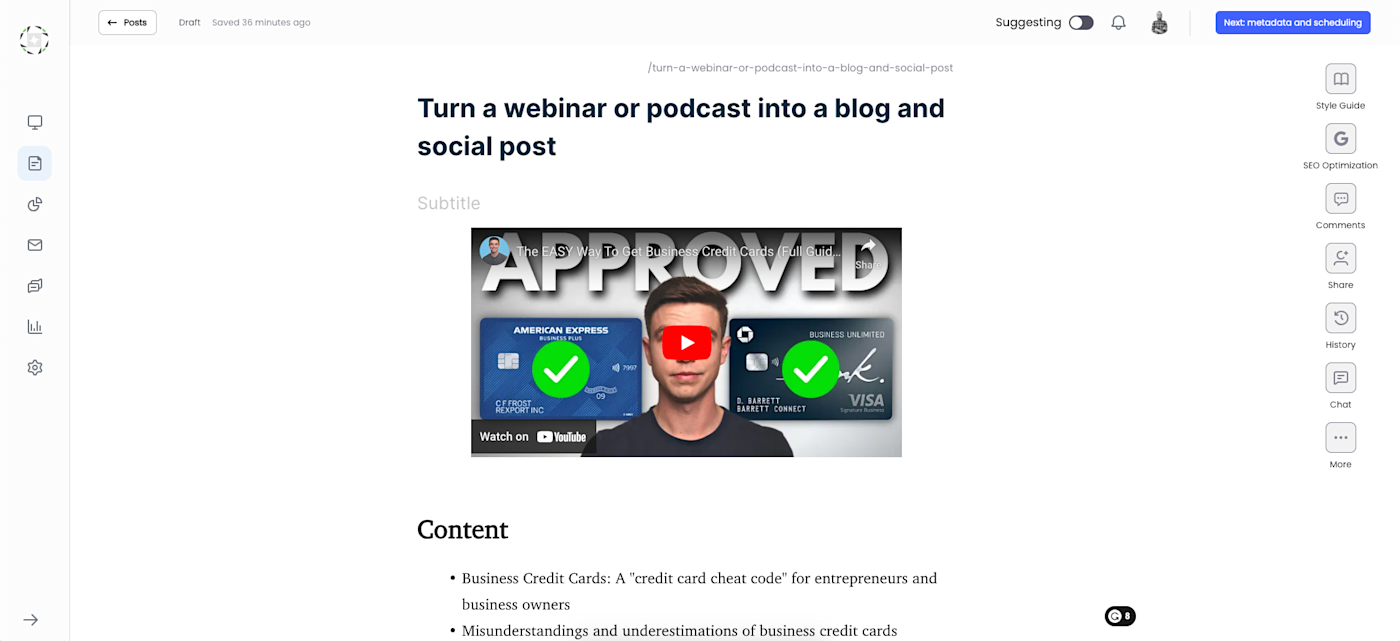
SEO tool category: Hybrid
Letterdrop pros:
Automatically turns video content into blog posts
Has content management capabilities
Find and Replace feature changes internal links in batches
Letterdrop cons:
Not as feature-rich as competing all-in-one SEO tools
Reporting and diagnostic tools aren't as rich as some competitors
In a world of very similar SEO tools, Letterdrop is kind of in a category of its own. Part content management solution, part SEO auditor, part keyword research tool, it's a unique product that does a little bit of a few different things. But one really distinctive feature is how it integrates content automation capabilities.
Where most products on this roundup revolve around keywords in some capacity, Letterdrop starts and ends with the content itself (though it does have a decent keyword research tool). By connecting the platform to your website or individual blog posts (and Google Analytics while you're at it), Letterdrop gives rich insights into your on-page performance. It's also a great one-stop sitewide performance optimization tool, with internal linking features you can use to replace internal links, add links to keywords, and fix broken links en masse. I also like the Pages to Refresh feature, which suggests… pages that could use refreshing—specifically, pages that are almost ranking, could be split into multiple pages, or cannibalize keywords.
When it comes time to write new posts, you can turn Letterdrop's content suggestions and keyword research into optimized posts with almost suspicious ease. Letterdrop comes preloaded with eight blog templates, which can give you a quick head start on outlining common frameworks like listicles or X vs. Y posts, or you can create your own templates to help develop content at scale. But Letterdrop's real standout feature is its ability to turn video content into blog posts. Just drop a link to a YouTube or Loom video or upload your own video file, select an applicable template, provide instruction, and boom: blog post. Letterdrop transcribes the video and finesses the copy into your chosen template structure.
Can Letterdrop totally automate your entire content schedule? No. Is it a truly all-in-one SEO tool? Also no. But as a hybrid content creation platform with cool automation features designed to help you produce quality content, it's one of the most interesting tools on this list. Plus, Letterdrop integrates with Zapier, enabling users to connect it to thousands of other apps to enhance it with even more automation.
Create Airtable records when a new posts is are published in Letterdrop
Create Letterdrop subscribers and Google Sheets spreadsheet rows from new Typeform entries
Receive Slack alerts when new readers unsubscribe in Letterdrop
Letterdrop pricing: By request
Best SEO tool for content ideation
BuzzSumo (Web)
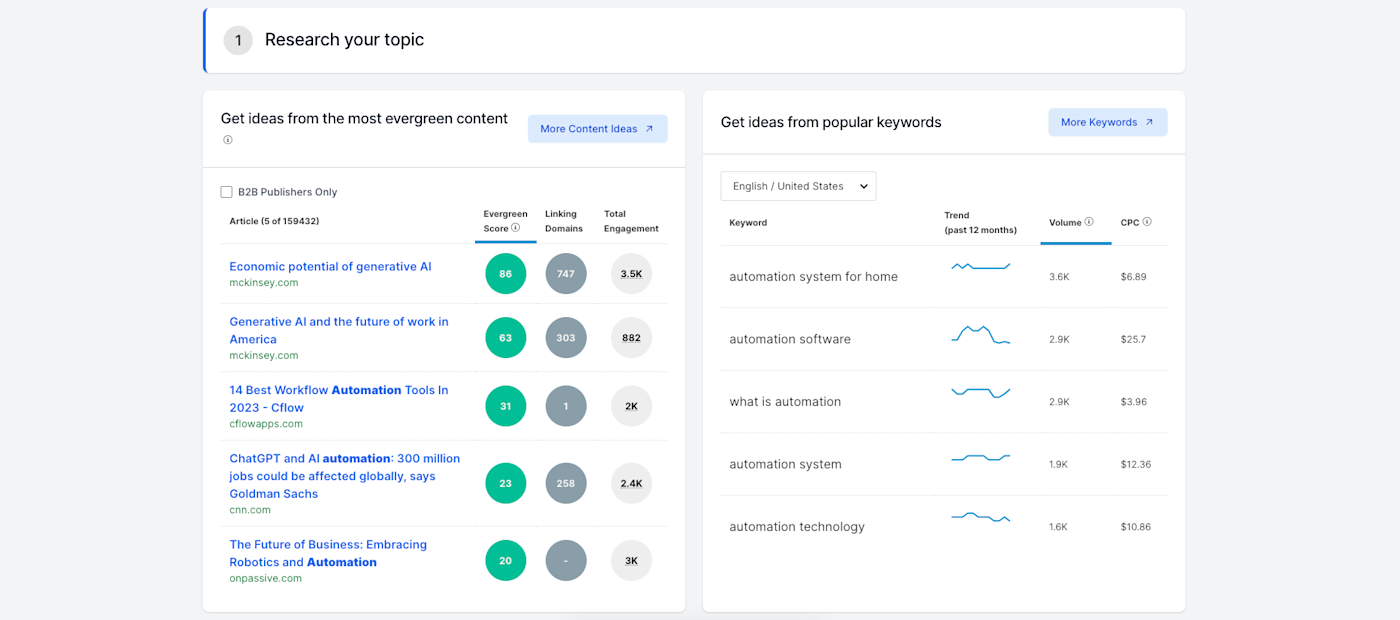
SEO tool category: Keyword research
BuzzSumo pros:
Rich keyword data
Unparalleled content idea tools
Robust suite of content analysis tools
BuzzSumo cons:
Premium price
Limited reporting features
BuzzSumo is a keyword research tool that offers better search trend reporting, topic idea generation, and search engine results page (SERP) monitoring than most all-in-one products with keyword research functionality. It's more feature-rich than AnswerThePublic but comes at a price tag comparable to all-in-one suites.
While you can do decent keyword research on all-in-one and rank tracking platforms, BuzzSumo gives you what you pay for with a much richer suite of keyword tools. BuzzSumo's keyword tool is better than average: you get a list of basic CPC and volume metrics, along with a handy "Articles Published" metric to see how much competition it has, along with a cute little line graph of volume trends. Each keyword suggestion below comes with its own profile, which lists question concepts, article ideas, and detailed search volume charts.
What I really like is the Content Generator. Just enter a topic, and you'll get evergreen topic concepts with engagement scores and linking domain stats, along with common questions related to the topic. Next, you'll see detailed projections for what your content will need to succeed based on ranking posts, including word count, content format, and post type (like "What Post" vs. "Why Post"). Finally, you get suggestions for publishing times and social media platforms to share it on.
Additional features include robust content monitoring, social media influencer ideas, outreach resources, automatic content brief generators, and content analyzers for webpages, YouTube posts, Facebook pages, and backlinks. For pure content research and ideation, BuzzSumo is well worth its subscription price, even if you already use rank trackers or all-in-one platforms.
BuzzSumo pricing: Content Creation ($199/month), PR & Comms ($299/month), Suite ($499/month), Enterprise ($999/month)
Best SEO tool for content research on a budget
AnswerThePublic (Web)
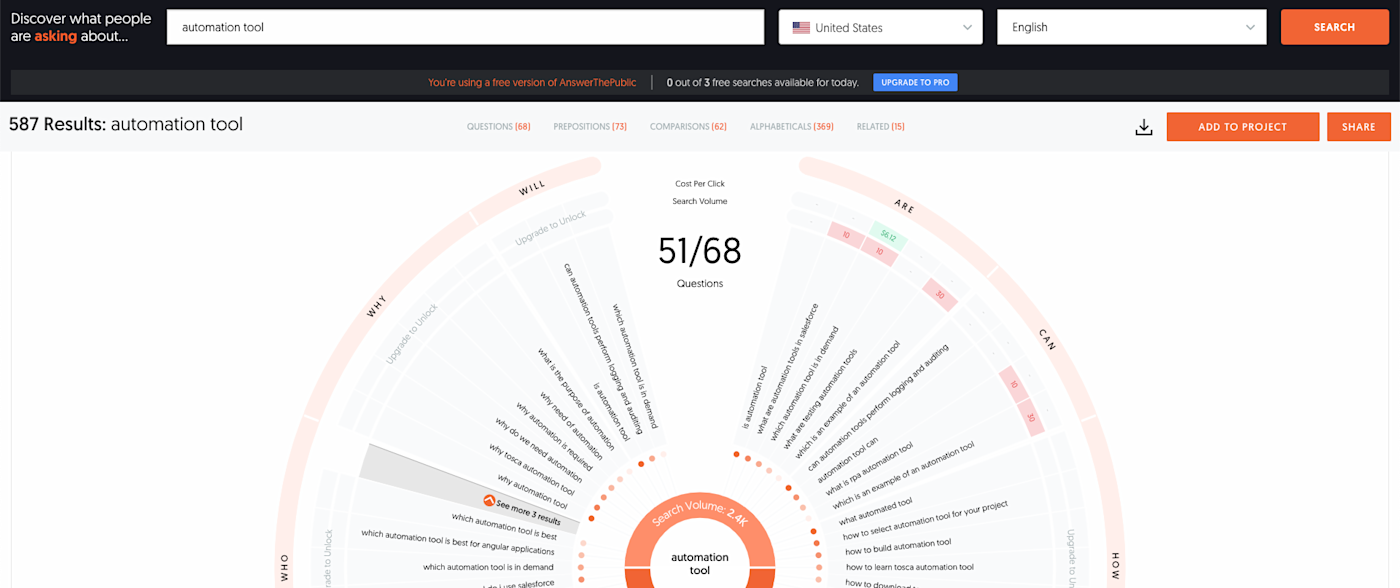
SEO tool category: Keyword research
AnswerThePublic pros:
Very affordable, with lifetime offering on lowest tier
Unique data visualization
Search trend monitoring and alerts
AnswerThePublic cons:
Limited to keyword research data
Only includes search data for Google, YouTube, and Bing
The self-proclaimed tool for discovering what people are talking about, AnswerThePublic (ATP) gives users access to uniquely useful search insights for a fraction of the cost of high-end keyword tools.
What I like about ATP is that it boils keyword research down to its real essence: user search behavior. Typical keyword research tools tend to feel somehow divorced from the real users who drive the metrics, with the usual keyword difficulty (KD) and cost-per-click (CPC) making search terms feel more like website assets than user signals. ATP reports on all those metrics, too, of course, but its data presentation and segmentation help marketers get closer to the core of user intent.
When you enter a search query in ATP, you get an instant overview of volume and CPC, as well as a handy visual breakdown of how well the query ranks in terms of volume potential and transactional intent. Instead of charting out related queries in a basic line-by-line grid, ATP offers highly dynamic wheel visualizations based on frameworks for questions (how, are, will), prepositions (can, for, without), and comparisons (vs, and, like). Below that, you'll see longtail variations organized by letter, followed by one more visualization for related terms. Each term includes color-coded volume and CPC metrics, and you can switch any visualization to standard data table views, all of which can be exported as CSV files or downloaded as hi-res images.
I also like how you can organize searches into projects, hide irrelevant keyword trees, take and save data insights to compare them with historical data, and enable search trend alerts so you don't miss out on timely opportunities. All these features come at rock-bottom pricing of $9/month, with a very compelling $99 flat fee for lifetime access to the Individual plan. For the price, I don't think you can beat AnswerThePublic for raw keyword research.
AnswerThePublic pricing: Individual ($9/month or $99 lifetime), Pro ($99/month), Expert ($199/month)
SEO tools I liked but didn't crack the list
Am I saying there are only nine great SEO tools on the market? Definitely not. Below are some of the products I really liked but didn't quite make it into the list. Each of these has at least one standout feature or use case for SEO marketers.
RankIQ: Unique keyword research platform that packages queries into hundreds of preset topic niches, organized by difficulty versus volume
Rank Ranger: Cheaper than premium rank tracking and all-in-one platforms, and includes a suite of white-label reporting tools
SE Ranking: Quality rank tracker with an extensive suite of tools at budget pricing for freelancers and SMBs
Rank Math: Comprehensive WordPress SEO plugin that gives Yoast a run for its money
SISTRIX: Comprehensive SEO platform with a unique visibility rating and Amazon search optimization features
Moz: High-end rank tracker with a ton of useful free tools (like the aforementioned title tag previewer)
Jasper: Generative AI writing tool with a suite of SEO-centric tools
What about Google's SEO tools?
The SEO sun rises and sets on the Google empire. Obviously Google's own search optimization tools are powerful, accurate, and indispensable—they just don't fit neatly onto this list. Even if you spend up on every product on this list, you'll probably still use these free tools.
Google Trends: Lets you explore global search trend data to capitalize on timely queries
Google Keyword Planner: Simple Google Ads tool for discovering cost-per-click keyword ideas and researching search query statistics
Google Analytics: Links to your domain to deliver detailed performance insights
Google Search Console: Diagnostic and reporting tool that helps you optimize your connected website's content
Even the best SEO tools do more with automation
Nailing down the single "best" SEO tool isn't really possible since there are so many different classes of SEO software to choose from. Picking the right product for your needs will depend on factors like your budget, your organization's size, and the tool's ability to integrate with other software you depend on.
Zapier can't help you with the first two points, but it can help you with the third. Its no-code implementation easily connects thousands of apps, so you can start automating marketing processes with your favorite SEO tools.
Zapier is a no-code automation tool that lets you connect your apps into automated workflows, so that every person and every business can move forward at growth speed. Learn more about how it works.
Related reading:






